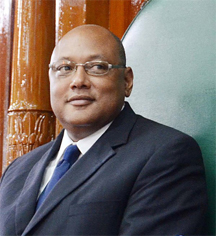Speaker of the National Assembly Raphael Trotman will be seeking legal advice on Friday’s ruling by acting Chief Justice Ian Chang on government’s challenge to a motion to gag Home Affairs Minister Clement Rohee in Parliament, and he did not want to speak definitively on it until he had a chance to fully examine it.
Justice Chang’s ruling seems to leave the question of whether Rohee can speak in the House to the Speaker and the procedures of the National Assembly. Chang ruled that Rohee, as an elected member of the National Assembly, has a right to speak in the House although it does not appear that this is enforceable in court.

“I did say in a letter to the Leader of the Opposition that I would put a halt to what I was doing until the [ruling from the court came],” said Trotman when contacted. “I did not consider any order from the High Court to be binding on me. [However], I would have to speak to my lawyers [on the ruling],” he said.
“We would be examining the ruling to see whether it coincides or collides with ours,” he said, referring to himself and the legal team who had advised him prior to him making a ruling in the House last month in a letter to the Opposition Leader and the Prime Minister.
In that letter, Trotman recalled that on November 22 he had ruled that a motion Leader of the Opposition David Granger had submitted seeking to prevent Rohee from “speaking in the National Assembly as long as he is purporting to carry out the functions of Minister of Home Affairs as published in the Official Gazette, should be referred to the Privileges Committee.
“In my considered opinion, I believed that the matters contained therein appeared to affect the powers and privileges of the National Assembly. Ancillary to this, I ruled that the Bill in the name of the Hon Minister of Home Affairs, the Firearms (Amendment) Bill of 2012, would not proceed, and neither will any Bill or Motion presented in his name whilst the issue is under consideration by the Privileges Committee,” Trotman wrote in his ruling.
The Speaker had said that he was of the firm opinion that the National Assembly is the sole authority to develop and apply its own methods and procedures, “and these shall not be overruled by any other authority.”
He had noted that the High Court, as one of the critical and established parts of the triumvirate that comprises the organs of State, “has the duty, as guardian of our Constitution, to give interpretations in times of grave constitutional confusion. This role as interpreter is vastly different from the role of referee, or combatant, that some seem to want it to play,” he said.








